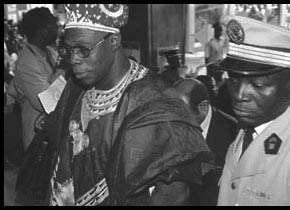 |
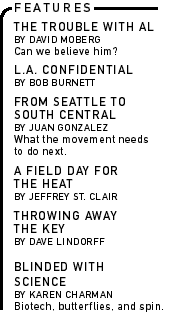
|
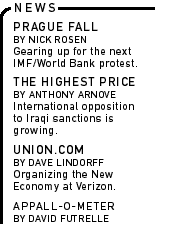
|
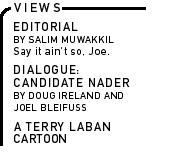
|
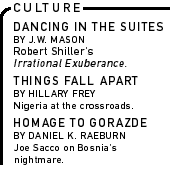
|
| |
 |
|
|
Even after a year of democratic leadership, Nigeria is hardly stabilizing. The imposition of sharia, Islamic law, is causing turmoil in its vast northern region, while oil spills and petroleum fires pollute and strip its damp, lush south. Poverty is pervasive. This is a country where teaching hospitals often lack running water or electricity, where men defecate at the sides of principal thoroughfares, where crippled war veterans beg en masse at roadsides. Nigeria's university system is a shambles, its government confused, its economy a disaster. And Nigeria's estimated 120 million people - who represent more than 300 ethnic groups - are restless. Although the United States has largely ignored Nigeria's struggles in the past, it would be wise to start paying attention. Nigeria is the biggest U.S. trading partner in Africa, the fifth largest supplier of oil to the American market, and the world's 10th most populous nation. At this precarious moment, with a civilian government in power for the first time in nearly 20 years, Nigeria stands as a tall example of West Africa's promise. If it fails, breaking up into separate countries or regions, a civil war is almost certain - one that threatens to be at least as bloody as the Biafran War of the late '60s,
Karl Maier's new book, This House Has Fallen: Midnight in Nigeria, offers a sobering appraisal of the numerous crises the country currently faces. A former Africa correspondent for the London Independent and author of two other books about Africa, Maier has learned to negotiate the notorious difficulties of Nigeria with confidence, if not always ease, and he shows it off with this book. Moving through the proud Yoruba southwest, the restive Igbo-dominated east, the Ogoni oil country and the Muslim (Hausa) north, Maier tells the story of each place with interviews and vignettes. Along the way, we meet village elders, political activists, unemployed youths; we see churches and mosques, sometimes a chief's house. From these people, we understand that Nigerians are direct, articulate and often funny, and that they love to talk. We also learn that they live on the brink of disaster. |

